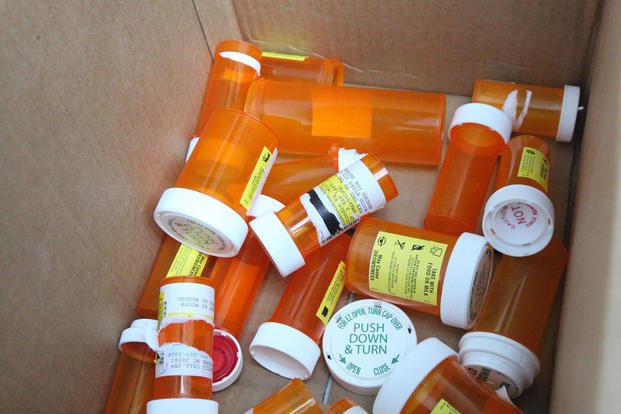The federal government has extended a rule that allowed physicians to prescribe controlled medications across state lines -- a pandemic exception that was set to expire Thursday that would have affected hundreds of thousands of veterans in the Department of Veterans Affairs health system.
The Drug Enforcement Administration and the Substance Abuse and Mental Health Services Administration, or SAMHSA, announced Tuesday they are extending all telehealth flexibilities allowed under the pandemic for six months, as well as the allowances for controlled medications prescribed through Nov. 11, 2024.
The VA has pushed for the expansion of telemedicine allowances that were introduced in the early weeks of the COVID-19 pandemic, to include medical treatment and prescribing across state lines.
Read Next: Fort Hood Gets a New Name Honoring a Texas-Born Four-Star General
According to VA Secretary Denis McDonough, the emergency declarations boosted the VA's ability to provide care to veterans in rural or remote areas, as well as those with disabilities that make it challenging for them to travel to and from appointments.
McDonough estimated that if the COVID-19 emergencies ended without any intervention, 2.7 million veterans in rural locales who use VA health care and another 1.3 million veterans who are not enrolled in VA health services would lose easy access to their prescription drugs.
The national emergency pandemic measures are set to end Thursday -- a move that will end federal allowances for hospitals treating COVID-19 patients, shift development of COVID-19 treatments and vaccines back to the private sector, and end the availability of free at-home COVID-19 tests and vaccines for consumers.
DEA officials said they needed extra time to review the 38,000 comments the agency received on proposed telemedicine rules it published in February, which called for permanently extending flexibility to prescribe certain non-narcotic medications without a prior in-person visit and allowed physicians to prescribe buprenorphine, the medication used to treat opioid use disorder, without an in-person visit.
Under both proposals, however, the DEA set a prescription limit of 30 days, after which an in- person examination would be required to receive refills -- a limitation that raised concerns among many patients.
DEA officials said they are taking the comments they received on the proposal "seriously and are considering them carefully."
"We recognize the importance of telemedicine in providing Americans with access to needed medications, and we have decided to extend the current flexibilities for six months while we work to find a way forward to give Americans that access with appropriate safeguards," DEA Administrator Anne Milgram said in a press release Tuesday.
Congress has extended permissions for providers to conduct appointments online for two years, but the prescription allowances, particularly the waiver of a Drug Enforcement Agency requirement that controlled substances such as opioids, attention-deficit/hyperactivity disorder (ADHD) medications and benzodiazepines must have an in-person medical evaluation, also would have expired, prompting the DEA to publish the two interim rules in February.
Now, the federal government has until Nov. 11, 2023, to decide the future of some telehealth prescriptions, while those with existing prescriptions of many controlled medications will retain them through November 2024.
"We strongly support policies that promote access to effective and safe treatment for opioid use disorder, including through telemedicine platforms, and ensuring continued access to necessary controlled medications past the COVID [public health emergency]," said Miriam Delphin-Rittmon, assistant secretary for mental health and substance use at the Department of Health and Human Services, referring to the ability to prescribe drugs for the treatment of opioid addiction.
More than 1.1 million Americans have died from COVID-19 since February 2020, including at least 24,642 veterans. Cases, hospitalizations and deaths are on the decline, with 1,109 Americans dying last week from the disease, according to the VA and the Centers for Disease Control and Prevention.
-- Patricia Kime can be reached at Patricia.Kime@Military.com. Follow her on Twitter @patriciakime.
Related: VA to Congress: Keep Pandemic Rule Allowing Prescriptions Across State Lines













